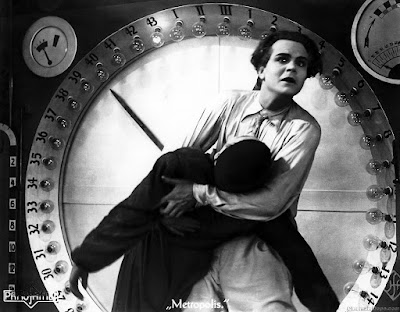Dear Diary,
First, I'm not sure why I keep writing to you, because you never write back.
But now that I've accompanied my last silent film program for 2024, it's time to look back at the year's highlights, and even a few lowlights, if only for contrast.
First, the numbers...the past year saw me create live music for a total of 86 silent film programs in nine states—most in my home base of New England, but a few in glamorous faraway locations as Cleveland, Ohio; Topeka, Kansas; Ocala, Florida; and Niles, Calif.
That's down slightly from the recent pace of 100+ screenings per year, but consciously so. My day job as museum director has me coordinating three programs in which high school students are building airplanes, and that's been taking up a lot of my attention.
In terms of highlights, the screening I found most rewarding was tackling Abel Gance's seven-hour epic 'La Roue' (1923) all in one go for Silent Movie Day in September. Very much appreciate the willingness of the Brattle Theatre in Cambridge, Mass. to program and let me accompany this remarkable film. Thanks also to the 40 souls, plus or minus, who stayed for the whole thing. Wow!Now that I've done it once, and lived, I'd like to take 'La Roue' on the road and do it in other places in 2025. Let me know any venues that might be up for a seven-hour silent film immersion.
Another highlight was heading up to Maine in July to do music for Ed Lorusso's Silent Film Festival up in Gardiner, Mane. I'd never played in that area before and response was gratifying.
It was a real privilege to help bring Ed's program to life. Same thing with the Lois Weber Film Festival in central Mass.—it was a real kick to bring effective silent film music to this enthusiastic audience.
Alas, probably the low point for me was having to cancel a screening in November (something I rarely do) at the last minute due to a kidney stone. I'm better now (famous last words, I know) and the screening is being rescheduled to later in 2025.
In terms of fellow accompanists, I had the privilege of working with (and hearing) Ben Model, Rodney Sauer, and (for the first time) Donald Sosin. They're all top-notch and it's inspiring to hear what they do.
I also got to hang with silent film musician and organist Peter Krasinski, but the only accompaniment that happened when we got together was the drinks that went with dinner prior to attending a BSO concert.
Lots of wonderful new venues this year that I hope to return to. Among them: the First Congregational Church in Reading, Mass.; the West Newton Cinema in West Newton, Mass.; Pothole Pictures in Shelburne Falls, Mass.; the Moultonborough (N.H.) Public Library; and the long-running Walker Lecture Series (now with silent film!) in Concord, N.H.
Many thanks to the many venues that continue to regularly program silent films with live music, for which I am ever grateful. It's hard to single any out but I very much appreciate the ownership, staff, and patrons of the Town Hall Theatre in Wilton, N.H. (which functions as my home base); the Somerville Theatre in Somerville, Mass.; the Flying Monkey Moviehouse in Plymouth, N.H.; the Jane Pickens Theatre in Newport, R.I.; the Garden Cinemas in Greenfield, Mass.; the Rex Theatre in Manchester, N.H.; the Leavitt Theatre in Ogunquit, Maine; the Center for the Arts in Natick, Mass.; the Coolidge Corner Theatre in Brookline, Mass.; Epsilon Spires in Brattleboro, Vt. and the Brattle Theatre in Cambridge, Mass.Special thanks to Dennis Marden and all the volunteers at the Brandon Town Hall and Community Center in Brandon, Vt., where I've been performing regularly since 2011. This season marked the final year of the volunteer group that's managed the venue, which will now be run by the town's Recreation Department. In some good news, the town has agreed to continue the series, which supports the ongoing renovations and preservation of the venerable old building. So I'll be back in Brandon in 2025!
And a special tip of the hat to everyone at the Kansas Silent Film Festival, which I've attended each year since 2000 (yikes—do the math) and which I look forward to every February. As I say: most people go to Aruba in February. I go to Topeka!
Although I regularly accompany repeat screenings of big titles such as 'The General' (1926) and 'Nosferatu (1922), I still try to work in films I haven't encountered before. This year I tackled a good number of new films (well, new to me) which brought my overall grand total to exactly 400 as the year ended.
If you'd like to see the complete list, it's posted online here.
Finally, it was a genuine pleasure this year to make the acquaintance of a person who occasionally attends silent films I accompany when they're based on great works of literature. This person actually reads the books first and then comes to see how the movie compares.
You know who you are. Thank you for your interest and encouragement!
So, Diary—what do you make of all this? Diary? Hello?
Well, the calendar now goes somewhat quiet until late January, with only a screening of Harry Langdon's comedy 'The Strong Man' (1926) on Monday, Jan. 6 at the Garden Cinemas in Greenfield, Mass. to break things up. (Among the things I hope it breaks up is the audience. Har!)
Thanks again to everyone who supported and facilitated this ongoing silent film experiment during 2024. Wishing all a memorable holiday season however you celebrate it. See you in a darkened theatre when the days begin getting longer!
—Jeff Rapsis






